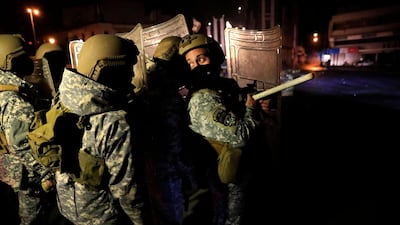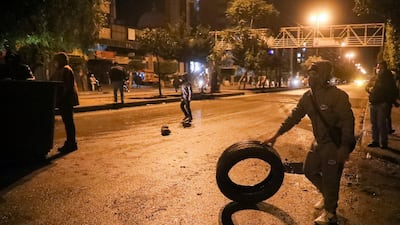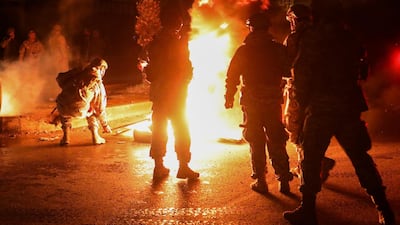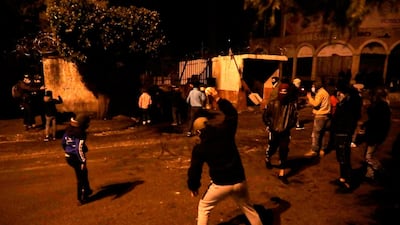Large protests swept Tripoli this week as residents defied strict Covid-19 lockdown measures to demand financial support and better living conditions in one of the poorest cities on the Mediterranean.
A man died on Thursday morning after he was shot in the back the night before by security forces who fired live ammunition at protesters, fuelling more anger and riots.
Thursday evening, protesters stormed the city’s municipal building and other government offices, setting them on fire.
Ghada Saraf, 39, protests daily in front of the Serail, the city’s municipal building. She said she had taken to the streets “because of unbearable poverty.”
“Our MPs are among Lebanon’s richest men,” she said. “God curse them, they have never helped us one bit.”
Although Tripoli is home to several business tycoons, billionaires and former prime ministers, the Sunni-majority city has long suffered from widespread poverty and neglect.
These grievances are now compounded by a severe economic crisis and the effects of the coronavirus pandemic.
Dubbed the “bride of the Revolution,” Lebanon’s second largest city has drawn large crowds to its streets since the onset of nationwide anti-government protests in October 2019.
Tripolitans called their movement a “revolution of hunger,” with big demonstrations persisting months after protests had died down in the rest of the country.
Protesters this week told The National that they had to choose between flouting lockdown measures so they can earn a living or going hungry.
The government announced plans to provide 400,000 Lebanese pounds ($263 – at the official exchange rate but only around $50 on the black market) per month to 230,000 poor families at the beginning of the Covid-19 crisis.
But this aid is not sufficient for a country of 6 million where more than half of the population now lives under the poverty line after a severe economic crisis struck in 2019.
This, however, is not new for Tripoli where the poverty rate was already at 57 per cent before the crisis, according to UN data. The rate was twice as high as in the rest of the country.
Today, that poverty rate is up to 70 per cent, estimated Chadi Nachabe, a political analyst, member of Tripoli’s municipal council and head of several development projects in the city.
In Lebanon, where the weakened state struggles with basic services, sectarian leaders and their political parties often provide a social safety net to their supporters with handouts, jobs and NGOs to assist with everything from travel to education and health needs.
This clientelist system has further weakened the state and left people reliant on handouts from their local political leaders.
While this system has stood since at least the early days of the country’s 15-year civil war in 1975, it has been strained across the board in recent years and in Tripoli, it has been entirely lacking.
The city has long been marginalised by the central government and forgotten by a Sunni leadership on the decline.
In the early years of Syria’s civil war that began in 2011, instability in the city was rife.
In a microcosm of the nearby Syrian conflict, fighting between groups of Sunni and Alawites in neighbouring areas of the city caused massive damage, hundreds of young men departed to join the war and many ended up in extremist groups. Terror recruiters also set up and cells were established to plot and carry out attacks in Lebanon.
The leadership vacuum and the already dire economic situation in the city has been attributed to fuelling the instability.
Order was brought to Tripoli in 2015 as politicians in Beirut agreed to send in a large military deployment and promised that the security plan would be followed by a development plan. The latter half of the deal was never implemented.
The city’s reputation was damaged by the period of fighting and instability.
Pro-Hezbollah figures and Lebanese government officials, including Prime Minister-designate Saad Hariri, now voice concerns that extremism is on the rise every time Tripolitans take to the streets.
These claims remain unsubstantiated thus far.
Mr Hariri, Lebanon’s Sunni leader, has been losing popular support among his downtrodden co-religionists in the north.
But the influential, mostly pro-Syrian families of Tripoli that rival Mr Hariri have also been on the wane.
Mr Nachabe says the financial support that local political elites used to provide to their supporters has run dry as the economy steadily worsened over the last decade.
“The lack of Sunni leadership in the country is reflected in Tripoli. The youth feel marginalised and the economic situation has always been very difficult,” Mr Nachabe told The National.
Residents said they want financial support and jobs, but feel ignored by their leaders.
Haitham, 34, has been protesting regularly this week. He said he makes roughly 400,000 Lebanese pounds working as a doorman and has been struggling to feed his family of four.
“Najib Mikati is the richest man in Tripoli, can’t he spare a bag of potatoes and a carton of eggs for people like us?” he asked.
Forbes estimates that the former prime minister and member of parliament is worth $2.3 billion and was once Lebanon’s richest man.
“Hariri and Mohamed Safadi are no better,” he said, referring to another millionaire Tripolitan businessman and former minister.
Sunni leaders, including Mr Hariri, have condemned the protests that turned violent.
Caretaker prime minister Hassan Diab described the rioters as “criminals” who must be “arrested one by one.”
Mr Mikati threatened to take arms against his constituents after demonstrators attacked an institute he founded and gathered in front of the houses of local MPs.
“The Shiite and the Christian political leaders help their people get by, but we have no one to look after us,” Haitham said.
“Even the mufti doesn’t care.”











